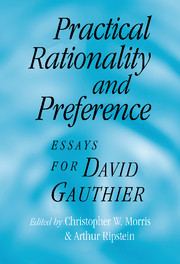Book contents
- Frontmatter
- Contents
- List of Contributors
- Practical Reason and Preference
- What Do Expressions of Preference Express?
- Preference
- Rational Temptation
- Bombs and Coconuts, or Rational Irrationality
- Are Intentions Reasons? And How Should We Cope with Incommensurable Values?
- Two Forms of Practical Generality
- Psychology for Cooperators
- Which Games Should Constrained Maximizers Play?
- The Strategy of Cooperation
- We Were Never in Paradise
Bombs and Coconuts, or Rational Irrationality
Published online by Cambridge University Press: 11 January 2010
- Frontmatter
- Contents
- List of Contributors
- Practical Reason and Preference
- What Do Expressions of Preference Express?
- Preference
- Rational Temptation
- Bombs and Coconuts, or Rational Irrationality
- Are Intentions Reasons? And How Should We Cope with Incommensurable Values?
- Two Forms of Practical Generality
- Psychology for Cooperators
- Which Games Should Constrained Maximizers Play?
- The Strategy of Cooperation
- We Were Never in Paradise
Summary
In an early article, Gauthier argued that, to act rationally, we must act morally. I tried to refute that argument. Since Gauthier was not convinced, I shall try again.
Gauthier assumes that, to be rational, we must maximize our own expected utility. Though he distinguishes between ‘utility’ and ‘benefit’, this distinction does not affect his main arguments. We can regard him as appealing to the Self-interest Theory.
Many writers have argued that, in self-interested terms, it is always rational to act morally. According to most of these writers, morality and self-interest coincide. But that is not Gauthier's line. Gauthier concedes that acting morally may be, and be known to be, worse for us. He claims that, even in such cases, it is rational to act morally.
If we appeal to the Self-interest Theory, it may seem impossible to defend that claim. How can our acts be rational, in self-interested terms, if we know them to be worse for us? But Gauthier revises the Self-interest Theory. On the standard version of this theory, an act is rational if it will maximize our expected benefit – or be expectably-best for us. On Gauthier's version, we should aim to benefit ourselves not with our acts but only with our dispositions. A disposition is rational if having it will be expectably-best for us. An act is rational if it results from such a disposition.
Besides revising the Self-interest Theory, Gauthier restricts the scope of morality. To act morally, Gauthier claims, we must honour our agreements.
Information
- Type
- Chapter
- Information
- Practical Rationality and PreferenceEssays for David Gauthier, pp. 81 - 97Publisher: Cambridge University PressPrint publication year: 2001
Accessibility standard: Unknown
Why this information is here
This section outlines the accessibility features of this content - including support for screen readers, full keyboard navigation and high-contrast display options. This may not be relevant for you.Accessibility Information
- 10
- Cited by
